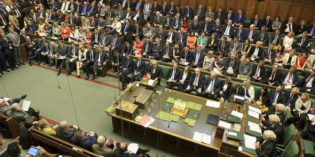Tag: Felicity Matthews

Behind the scenes of the Conservative–Liberal Democrat Coalition
The UK’s Coalition government of 2010–15 was established with an array of formal agreements and rules for cooperation. However, finds Felicity Matthews, the informal norms and micro-level practices of individual relationships were critical to its operation. This opens up a new area in research, which focuses on the detailed practices of multi-party governance.

How majoritarianism endures in the structures of the UK’s devolved institutions
Scotland and Wales’ devolved political institutions, elected under proportional Additional Member electoral systems, were intended to produce a more consensual political culture. However, writes Felicity Matthews, although their electoral rules have increased the proportionality of representation, the structures of the Scottish Parliament and National Assembly for Wales have meant that a more consensual approach to policy-making has been more limited than might have been expected.

Majoritarianism reinterpreted: why Parliament is more influential than often thought
Though Westminster is often seen as lacking the teeth to affect government policy, this is not the case, writes Felicity Matthews. She argues that reforms to shift the balance between government and parliament have served to offset the declining vote basis of government, and have ensured that Westminster remains responsive to a majority of the electorate through the legislative process.

As the current parliament progresses, the dissonance between constitutional norms and governing reality may prove too great to ignore
This May’s General Election saw the end of the first full coalition in post-war British politics, between the Conservatives and the Liberal Democrats. The partnership brought together two parties with distinct constitutional philosophies, and entailed a trade-off between principle and pragmatism which saw the latter’s electoral evisceration. Felicity Matthews looks both backwards over the last five […]

Select Committee pre-appointment hearings have helped rebalance the relationship between the government and parliament – but have also created unintended consequences
The Labour government of 1997-2010 introduced pre-appointment hearings for some ministerial appointments, formalising a de facto system which had been developing gradually. Felicity Matthews shares research which shows that these hearings have created a new balance between the executive and parliament to an extent, but that there have been unintended consequences such as ‘scrutiny creep’ and […]

Any reform to the arrangements for governing England must take account of the country’s diversity of views
Labour MP Emily Thornberry’s controversial tweet has once again fuelled debates about English identity and constitutional reform. Felicity Matthews looks at Prime Minister David Cameron’s defence of his ‘English votes for English laws’ proposal. She argues that the diversity of views within England should be taken into account, or the union may be vulnerable to […]

Appointments to public bodies are fraught with issues regarding executive control, politicisation and ministerial accountability
The recent row triggered by the decision of Michael Gove to not re-appoint the Labour Peer Baroness Morgan to a second term as the Chair of Ofsted has been subject to severe criticism, with many observers suggesting that it marks the latest instalment in a systematic purge of non-Conservative figures who head public bodies. In assessing the politics […]


 Democratic Audit's core funding is provided by the Joseph Rowntree Charitable Trust. Additional funding is provided by the London School of Economics.
Democratic Audit's core funding is provided by the Joseph Rowntree Charitable Trust. Additional funding is provided by the London School of Economics.